#To the Island of Tides: A Journey to Lindisfarne
Text
Getting back to Marmion! Some bits of context for the last few days’ posts.
A palmer was sort of a continual pilgrim, who spent a period of time travelling to holy sights and praying. The greatest holy sight of all was Jerusalem, where the palmer in the poem has in fact been, along with a huge list of other holy sights, from Mt. Ararat where Noah’s Arc reputedly came to rest after the Flood, to Mt. Sinai, to Santiago de Compostela in Spain, and in England Durham and Canterbury among others.
I think (I am not sure) palmer paid for their travels in part by donations from pious people, who might want the palmer to pray for them at some shrine. Marmion himself expresses a more lighthearted picture of palmers in general -
I love such holy ramblers; still
They know to charm a weary hill,
With song, romance, or lay:
Some jovial tale, or glee, or jest,
Some lying legend, at the least,
They bring to cheer the way.”
- and that may not be unrealistic for a category of people that could have included the medieval equivalent of a tourist with a GoFundMe. But this palmer is not of that kind - he’s haggard and gloomy, and kind of disturbing with his nighttime mutterings. But Marmion chooses to accept him as a guide all the same, and the next morning the whole group departs.
The first canto (The Castle) ended, we switch scenes and characters for the second (The Convent), to a boat travelling north, up the eastern coast of England, from Whitby to the island of Lindisfarne (also called St. Cuthbert’s Isle) with a group of nuns aboard. Now, where has Lindisfarne been mentioned in the previous canto? In the bit about Marmion’s former page:
That boy thou thought’st so goodly fair,
He might not brook the Northern air.
More of his fate if thou wouldst learn,
I left him sick in Lindisfarne:
The voyage is both a little scary and exciting for the nuns, who don’t get out much. Many of the castles the pass, like Warkworth and Dunstanburgh and Bamburgh, are ones you can still see on the Northumberland coast today.
But two of the group in particular are not having fun: the abbess (chief nun), who is not named, and the novice (i.e., has not yet taken vows and become a nun) Clare. Clare joined the convent recently after the loss of the man she loved, and in order to escape an unwelcome suitor who is trying to marry her in order to get at her property.
She was betrothed to one now dead,
Or worse, who had dishonoured fled.
Her kinsmen bade her give her hand
To one who loved her for her land;
Herself, almost heart-broken now,
Was bent to take the vestal vow,
And shroud, within Saint Hilda’s gloom,
Her blasted hopes and withered bloom.
On top of these griefs, there’s been an attempt to murder her, and the people who attempted it are now prisoners in Lindisfarne awaiting trial:
And jealousy, by dark intrigue,
With sordid avarice in league,
Had practised with their bowl and knife
Against the mourner’s harmless life.
This crime was charged ’gainst those who lay
Prisoned in Cuthbert’s islet grey.
Moving back a bit to yesterday’s entry, this is why the abbess of Whitby is going on this journey: to sit in judgement on these attempted murderers.
Sad was this voyage to the dame;
Summoned to Lindisfarne, she came,
There, with Saint Cuthbert’s Abbot old,
And Tynemouth’s Prioress, to hold
A chapter of Saint Benedict,
For inquisition stern and strict,
On two apostates from the faith,
And, if need were, to doom to death.
Lindisfarne is a tidal island: at low tide it is a peninsula that can be reached from the mainland across mudflats, but at high tide it is an island.
The tide did now its floodmark gain,
And girdled in the saint’s domain:
For, with the flow and ebb, its style
Varies from continent to isle;
As the ship reaches Lindisfarne, the nuns of Whitby on the ship sing a hymn, and the nons and monks of Lindisfarne sing one in return.
13 notes
·
View notes
Text
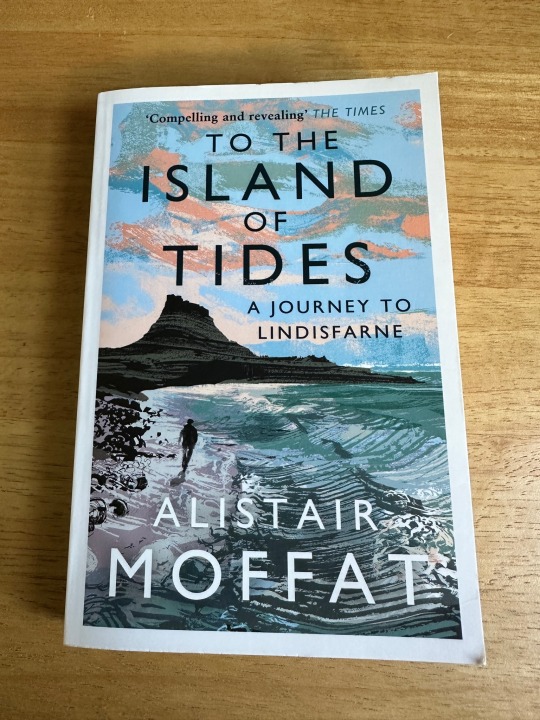
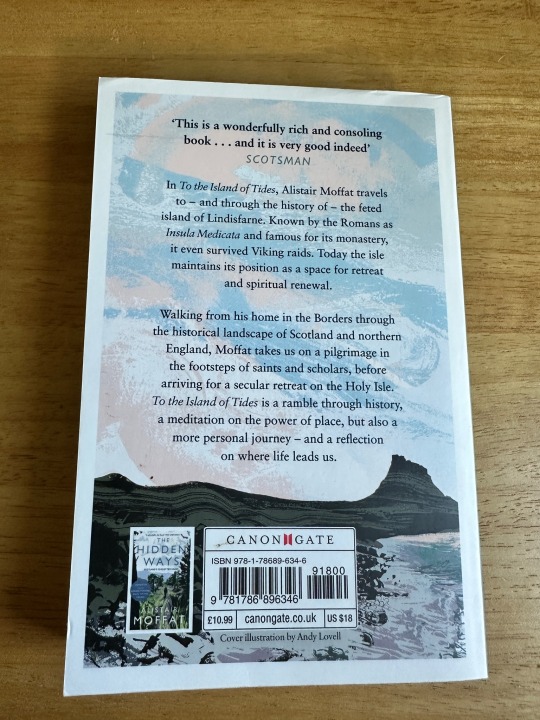
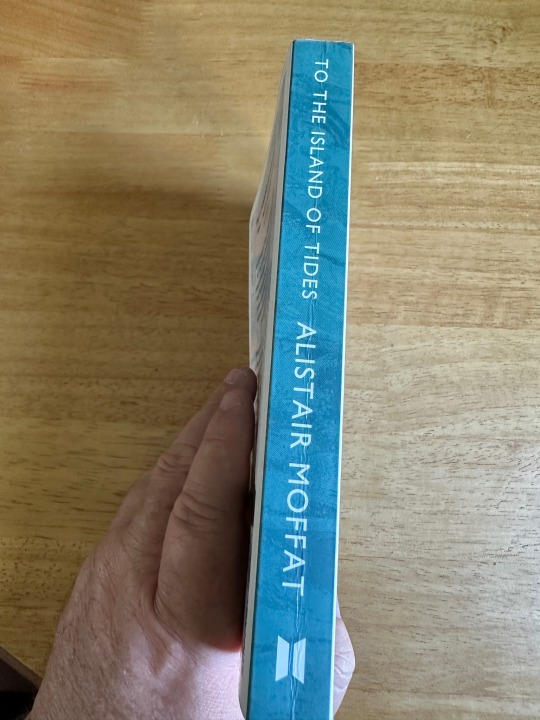



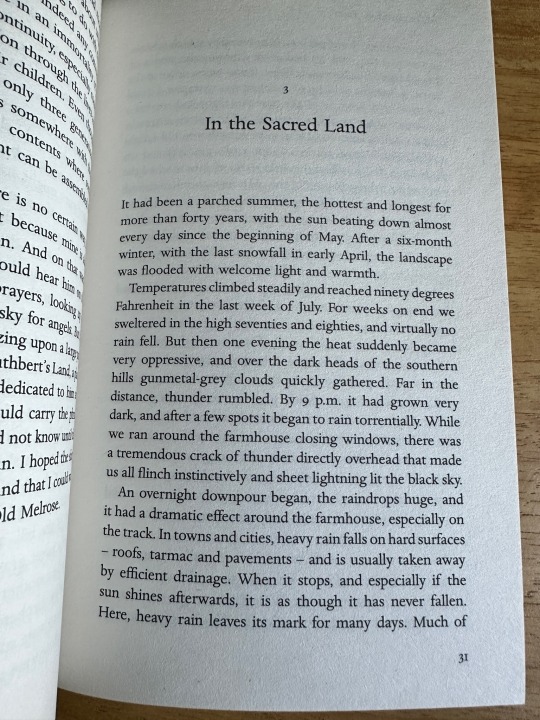
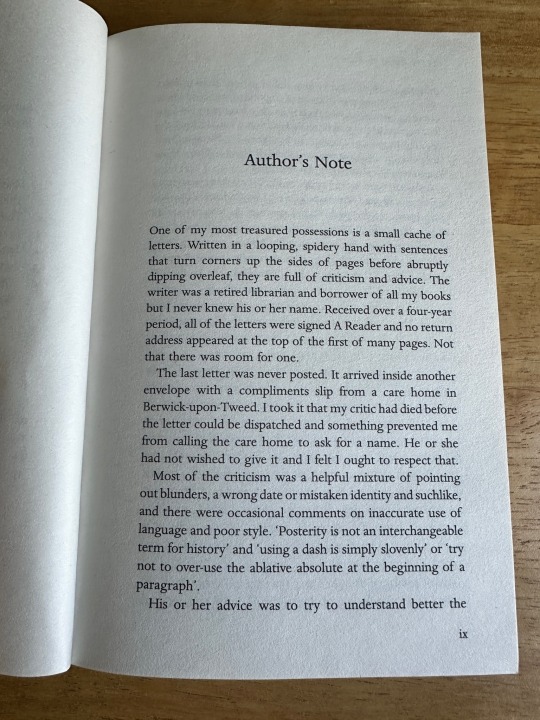

0 notes
Text
From The Isle of Lindisfarne to Columbia, Missouri

The key to finding what’s missing in your journey
Trust …your …instincts
I’m finally feeling a bit settled here in Columbia, Mo. There’s been some unusual adjustments on round five: Brent & Kim travel America. The eleven hour drive as a middle aged man and his three middle aged dogs was exhausting, “We ain’t as young as we used to be,” …who of us is anymore? Driving lag took a toll, but we moved forward. I got a late start today, but here I am. It’s 78° with comfortable gusts blowing making a wonderful day for early August. With things calming a bit, I’ve had time to re-examine the internal questions that Alistair Moffat’s book, To The Island of Tides, awakened in me after reading.
Our travels are essentially life resets every three months. Stressful? Yes, but in the most positive way I could imagine. It forces us to physically evaluate what we have, what we need, or did we leave anything out. If you just happen to be engaged in an intrinsic look inward, you’re in the perfect state of mind to determine needs, wants, what’s missing. Every time we land in a new spot, the basic human reaction is to establish a status quo to alleviate any “new home” anxiety. Basic needs are met quickly, but I then look for the things that give a sense of calm and comfort and familiarity. Coffee shop, walking trails, sites to see, a pub, places to read etc. etc. all come to the fore. The key thing about all of these locales is that they are all part of solitary pursuits that allow for quiet reflection and introspection. It’s cool; I haven’t come across any unknown psychoses… I know all of those. Three months at a time invites a time is running out imperative to address the deeper questions about what is missing inward. A very different mindset from Moffat’s in his book, but similar in that an awareness that time is quietly passing. A slight difference is that I’m not sixty eight like Mr. Moffat and the ticking clock is somewhat muted.
Since each move is a new wake up call, the questions come quickly once the first three to four steps of Maslow’s Hierarchy of Needs are met. The questions are basic, but touch on higher levels the more I think on them. Am I alone? Well, yeah at the beginning, but meeting people is part of the adventure. The deeper meaning resonates beyond just simple conversation; the “missing” element is true companionship …a true sense of belonging. This excludes my relationship with Kim as we are without question each other’s best friend; but I often feel without that relationship, I’m alone and feel lonely. Hollow chit chat and feeling lonely, in my opinion are unbearable. There has been much discussion about a dwindling circle of friends as we get older; and I’m fortunate to have the Great Triumvirate and my cigar lounge pals, even though I go for months without seeing them. I know they’re there, but absence of their presence and conversation is unpleasant. The truth is laid open: frequent, quality friendship are as necessary as breathing for this teacher. Aging brings the reality that people will come and go in our lives …and it can disconcerting when you see so many go and pass from your day to day life. This is something that is missing and its possible prolonged absence concerns me. It is what it is I suppose.
In the next few days and weeks, I hopefully expect to examine other essential elements that pervade my thinking. It’s a quest as certainly as Moffat’s quest in his book was and the saintly monks he examined. Inside and or outside of my being, I’ll seek out what’s vital to my peace of mind and now passively suffer their absence. Let’s get exploring.
0 notes
Text
Place-names can be emblematic, compressed nuggets of forgotten history, and the mouth-filling sensuousness of Lindisfarne may have a tale to tell. It seems that the Romans knew it as Insula Medicata, and that may have referred to an island where plants grew that were useful for making balms, poultices or decoctions. Dialects of Old Welsh were spoken down the length of Britain before and after the Roman province of Britannia, and the native name of Ynys Medcaut derived directly from the Latin name.
Alistair Moffat, To the Island of Tides: A Journey to Lindisfarne
28 notes
·
View notes
Text
To the Island of Tides - Alistair Moffat
To the Island of Tides – Alistair Moffat
Non-fiction.
A pilgrimage, by its nature, is a personal journey of discovery as well as a geographical and historical trek. In To the Island of Tides, Alistair Moffat follows in the footsteps of Saint Cuthbert (634 – 687); monk, bishop and hermit. From the Scottish Borders to the Holy Island of Lindisfarne, Moffat endures a broken rib and faces some deep familial sadness as he immerses himself in…
View On WordPress
0 notes
Text
What’s in a name?
This is interesting (taken from the Peregrini Lindisfarne Landscape Partnership Action Plan)…
“Throughout Britain, from AD500 to 1000, remote islands were being settled by monks and other devout itinerants. They built monasteries, cells and oratories and raised stone crosses to their God. These travellers were known as peregrini: the name derives from the Latin peregrinus and carries the idea of wandering over a distance, giving us the word pilgrim.”
So Peregrini means pilgrims, thousands of whom still regularly visit Holy Island today. A journey which culminates in the evocative walk across the Pilgrim’s Way, only possible at low tide and often accompanied by the music of singing seals. For hundreds of years, pilgrims have travelled, on foot, walking in contemplation, reflection or, perhaps celebration. This makes me think that my concept of a walking evaluation is all the more appropriate for this particular project.
0 notes
Text
Is Something Missing?

Alistair Moffat took me on a spiritual quest on the Isle of Lindisfarne .
Upon reading, inspiration hit like lightning
What’s been missing on this transitionary quest I’ve been on since changing my life in 2020? Anything? I’m not sure. I’m working on a number of my life goals pretty consistently; let a couple slide, nothing serious. I’ve traveled; I’ve written a helluva lot; spent amazing times with my grandchildren; carefully shepherded my doggie herd and still have many projects left to complete. Wife and I are having a blast seeing so many places and look forward to our futures. What is missing? I received an inkling while reading this morning.
I’m deeply engrossed with Alistair Moffat’s book To The Island of Tides: A Journey to Lindisfarne. The medieval monastery at Lindisfarne was the site of the first recorded Viking attack on Britain in 793. The monks wrote of ominous events that preceded the Viking raid:
Her wæron reðe forebecna cumene ofer Norðhymbra land, ⁊ þæt folc earmlic bregdon, þæt wæron ormete þodenas ⁊ ligrescas, ⁊ fyrenne dracan wæron gesewene on þam lifte fleogende. Þam tacnum sona fyligde mycel hunger, ⁊ litel æfter þam, þæs ilcan geares on .vi. Idus Ianuarii, earmlice hæþenra manna hergunc adilegode Godes cyrican in Lindisfarnaee þurh hreaflac ⁊ mansliht.*
("In this year fierce, foreboding omens came over the land of the Northumbrians, and the wretched people shook; there were excessive whirlwinds, lightning, and fiery dragons were seen flying in the sky. These signs were followed by great famine, and a little after those, that same year on 6th ides of January, the ravaging of wretched heathen men destroyed God's church at Lindisfarne
The Chronicles also presents the frightening prayer : Domine Deus salva nos a furore Northman. (Lord God, save us from the fury of the Northman).
Moffat’s focus on the Viking raid is only done in a cursory manner, as his quest is a spiritual one that reflects the journey of the much admired Saint Cuthbert who was prominent in the founding of several monasteries in the area, Lindisfarne being one. Cuthbert, after a lifetime of being an advocate of the early Celtic church, returned to the Isle in his twilight years to detach himself from the struggles of the world and look inward to better know God. A universal quest that all seek, even Moffat who is an atheist.
Moffat relates the story of Donald MacIver who, in the 1890’s, received a letter from an uncle who lived in Canada who had survived “The Clearances” of the Gaelic peoples of Scotland and Ireland. The British had shipped off his uncle Domhnall Ban Crosd from the Isle of Lewis to Canada as a young man.** It is of little surprise that “Crosd” was added to his name. Crosd means grumpy and Domhnall had good reason to be grumpy. Domhnall facing the end of his years, suffered from homesickness and a deep desire to see the land of his birth one last time. As I read, I discovered the Gaelic word “ionndrain.” The word, roughly translated means, a missing piece perhaps referring to the thought that a part of his soul had been left behind. Upon returning to his village, his heart was broken to see the completeness of the English cruelty. His home village had been razed to the ground and Domhnall Ban crumpled and wept.***
The story, powerfully written, awakened the thought of what might be missing in my current stage of life and would it be too late to retrieve it? The term “missing piece” doesn’t imply anything trivial like a missed appointment or losing one’s wallet. The meaning that I drew was a piece missing spiritually, of something familial or some sort of purpose. All of these possibilities are extremely subjective in nature and their pursuit strictly individual in nature. It’s my feeling that this concept need not take the form of regret, just something that was displaced by time. The whole idea was a bit unsettling as I read and drew me immediately inward. Do I miss my sons? Yes, but I’m proud and happy with they way are pursuing their lives, so I don’t think it’s the missing piece. Spiritual? As I mentioned, it’s a very subjective mindset, and though my spiritual beliefs are very much unconventional in regards to my raising; I believe myself to be the best “me” I’ve ever been in my life. With complete certainty, I believe that often in my life I’ve been a selfish s.o.b. Hopefully that is completely in the past.
Full blown in the “I got more behind me than in front of me” state of consciousness, a completeness of coming full circle is in order. Moffat wrote in admiring tones of the solitary, inward exploration of Saint Cuthbert and other monks of the Medieval age though his self examination is timeless and necessary. I can’t say at this moment that I have this figured out at all; but it is a path I feel compelled to explore …to leave nothing on the table as it were. There is a sense or need to identify any missing pieces, but not in any immediate sense, I ain’t going anywhere anytime soon. This teacher in transition is well aware that the transition will never end; but like the many goals I’ve set for myself, this is part of this amazing time of self discovery.
*Anglo Saxon Chronicles
**Moffat, Alistair; To The Island of Tides: A Journey to Lindisfarne; Canongate Books LTD.; 2019
***IBID. pg. 225
#open mind#retirement#coffetime#stress#change#teacher#i need friends#health#writing#education#Alistair Moffat#lindisfarne
1 note
·
View note